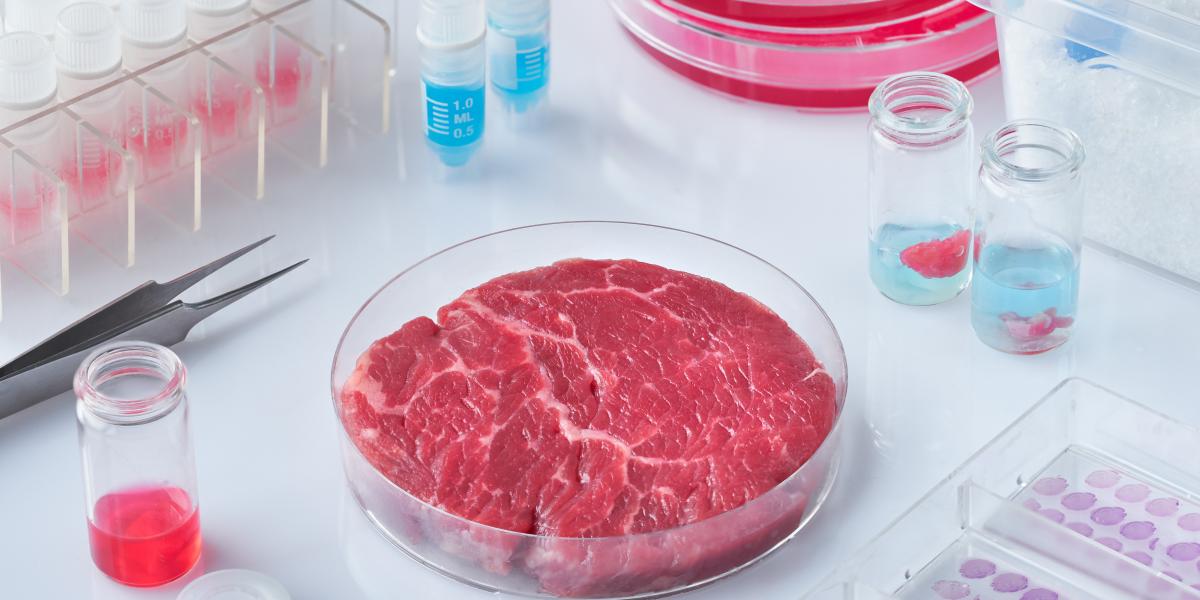


Last year, Ron DeSantis banned the sale of lab grown meat in Florida, and Texas, Alabama, and Mississippi have now followed suit. Two arguments form the main basis for the ban: 1) the need to protect American animal agriculture from undercutting; and, 2) cultivated meat itself being immoral due to its unnaturalness. Both fail. American animal agriculture must not necessarily survive and the unnaturalness of lab grown meat is no more immoral than the existence of GMO vegetables (i.e., not at all).
Lab grown meat involves taking a sample of cells from a live animal and then placing them in a bioreactor to grow into full chunks of flesh through a culture. Since 2013, when the first lab grown burger was eaten in London, the cost of one has fallen from $330,000 to just $9.80 today. It is no surprise then that conventional farmers want to ban cultivated meat before it starts to truly compete with them. Certainly, banning lab grown meat will keep demand for conventional meat artificially high, and, thus, will keep many farmers in business who might otherwise go under. Does this warrant a ban? No.
Frederic Bastiat famously wrote that a crucial error people make when looking at economic matters is to only consider the seen and not the unseen. Obviously if lab grown meat becomes cheaper than normal meat and soaks up demand for meat per se, then, many farmers will become unemployed. That is what is seen. The unseen, though, is where all the benefits lie. Unemployed farmers would reallocate to other areas and we’d be better off as we’d have as much meat from a more efficient process, plus, all the production of former farmers too. It is an iron law of social reality that interference in the free market diminishes this prosperity.
Is there anything unique about animal agriculture which should exempt it from free market reasoning? First, it might be said farming is a higher mode of existence than working at Walmart, thus, by stripping farmers of their livelihood, we’re worse off in the aggregate, due to the loss of these worthwhile roles. Perhaps there exists a Marxist concern about alternative work to farming being alienating insofar as it robs people of their creativity and self-direction. Second, replacing animal agriculture with lab grown meat might be objected to on utilitarian grounds because billions of animals in the future will not be brought into existence.
Even accepting the alienation point, 99 percent of animals today are reared in factory farms where workers are hardly granted self-direction and creativity, therefore, the argument hardly justifies a ban of lab grown meat since it’s not displacing non-alienated farming anyway. Small farms raising free range animals might be an exception here. However, we must fully understand what banning lab grown meat actually involves—using the violence of the state. The natural principle of human respect dictates we must never commit violence against others. To contravene this moral law would be to treat some men simply as tools or to ride roughshod over them, thus undermining the proper harmony of each individual pursuing their own flourishing as an end in itself.
Although utilitarianism might seem, at first, to support the continued existence of animal agriculture, chief proponents of it are actually totally opposed to factory farming. Peter Singer argues the vast majority of farm animals live in terrible conditions, for example, a majority of US hens—154.9 million—still live in battery cages. Let’s assume animal agriculture can be full of happy animals though. If products can be banned to ensure happy animals continue to be brought into existence, are we going to ban people from eating substitutes to them such as tofu, or, becoming vegan? Obviously not. Freedom must stand even if this means fewer animals turn out to exist; human happiness comes before abstract joy from future chickens.
Lastly, it will be argued lab grown meat is immoral because of its unnaturalness. There are many things which are “unnatural” which we all take to be morally permissible, for example, pink glow pineapple and other genetically-modified foods, IVF babies, and lab-produced diamonds. The unnaturalness of lab grown meat then is hardly reason to oppose it. Plus, should the unnatural production of meat be outlawed, then most chicken production would have to be banned too, as selective breeding by human intervention has ensured chickens grow to full size in a truly rapid 47 days compared to their more natural 70 days in 1950.
Lab grown meat is an exciting prospect for consumers who want a cruelty-free supply of meat and one of greater variety too, as nothing is to stop scientists creating lion steaks or elephant burgers. Creation of lab grown meat does not entail the prohibition of other meats, rather an opportunity for market competition and more options for willing consumers. Contrary to DeSantis and his ilk, there is nothing objectionable per se with a possible decline in animal agriculture, nor is there anything immoral in the unnaturalness of a product either. The agriculture lobby has ripped off consumers via tariffs, quotas, and subsidies for too long. They must not be allowed to further feather their nests by banning this great gastronomic innovation too.
